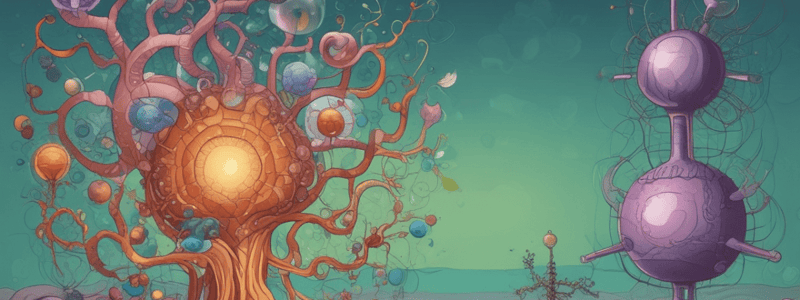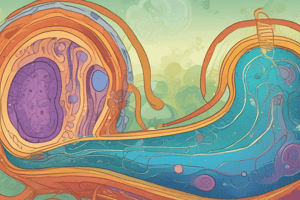Podcast
Questions and Answers
Where do fatty acid breakdowns occur in yeast and plant cells?
Where do fatty acid breakdowns occur in yeast and plant cells?
- Peroxisomes (correct)
- Mitochondria
- Chloroplasts
- Vacuoles
What is the function of catalase in peroxisomes?
What is the function of catalase in peroxisomes?
- Production of ATP
- Breakdown of fatty acids
- Defense against hydrogen peroxide (correct)
- Storage of substances
What is the structure of mitochondria?
What is the structure of mitochondria?
- Double membrane with cristae (correct)
- Triple membrane with cristae
- Single membrane without cristae
- Single membrane with cristae
What is the function of cristae in mitochondria?
What is the function of cristae in mitochondria?
What is the function of peroxisomes in animal cells?
What is the function of peroxisomes in animal cells?
What are vacuoles and vesicles?
What are vacuoles and vesicles?
Where do fatty acid breakdowns occur in animal cells?
Where do fatty acid breakdowns occur in animal cells?
What is the function of chloroplasts?
What is the function of chloroplasts?
What is the primary function of Nitrogen fixing bacteria like Nostoc pruniforme 2?
What is the primary function of Nitrogen fixing bacteria like Nostoc pruniforme 2?
What is the main function of chloroplasts in plant cells?
What is the main function of chloroplasts in plant cells?
Which type of archaea is known for producing methane as a metabolic byproduct in anaerobic conditions?
Which type of archaea is known for producing methane as a metabolic byproduct in anaerobic conditions?
What is the primary function of the nuclear envelope in a eukaryotic cell?
What is the primary function of the nuclear envelope in a eukaryotic cell?
What is the main component of fungal cell walls?
What is the main component of fungal cell walls?
What is the role of actin filaments in the cytoskeleton?
What is the role of actin filaments in the cytoskeleton?
What is the main function of Rough Endoplasmic Reticulum?
What is the main function of Rough Endoplasmic Reticulum?
What is the role of the nucleolus in the nucleus?
What is the role of the nucleolus in the nucleus?
What is the primary function of the middle lamella in plant cell walls?
What is the primary function of the middle lamella in plant cell walls?
What is the role of microtubules in the cytoskeleton?
What is the role of microtubules in the cytoskeleton?
What is the primary function of Smooth Endoplasmic Reticulum?
What is the primary function of Smooth Endoplasmic Reticulum?
What is the primary function of leucoplasts in plant cells?
What is the primary function of leucoplasts in plant cells?
What is the characteristic feature of Halophiles?
What is the characteristic feature of Halophiles?
What is the primary function of the outer nuclear membrane?
What is the primary function of the outer nuclear membrane?
What is the role of the primary cell wall in plant cells?
What is the role of the primary cell wall in plant cells?
What is the function of vesicles in plant cells?
What is the function of vesicles in plant cells?
What is the primary function of the Golgi Apparatus in eukaryotic cells?
What is the primary function of the Golgi Apparatus in eukaryotic cells?
Which type of vesicle is involved in the packaging and delivery of proteins destined for extracellular release?
Which type of vesicle is involved in the packaging and delivery of proteins destined for extracellular release?
What is the primary function of Lysosomes in eukaryotic cells?
What is the primary function of Lysosomes in eukaryotic cells?
What is the role of Peroxisomes in eukaryotic cells?
What is the role of Peroxisomes in eukaryotic cells?
What is the primary function of the Golgi Apparatus in terms of protein transport?
What is the primary function of the Golgi Apparatus in terms of protein transport?
What type of vesicle is involved in the storage of proteins prior to release?
What type of vesicle is involved in the storage of proteins prior to release?
What is the primary function of the Endosomes in eukaryotic cells?
What is the primary function of the Endosomes in eukaryotic cells?
What is the role of catalase in Peroxisomes?
What is the role of catalase in Peroxisomes?
What is the primary component of flagella in bacteria?
What is the primary component of flagella in bacteria?
What is the purpose of pili in bacteria?
What is the purpose of pili in bacteria?
How do chemo-heterotrophs obtain energy?
How do chemo-heterotrophs obtain energy?
What is the result of the flow of hydrogen ions through the complex in bacterial movement?
What is the result of the flow of hydrogen ions through the complex in bacterial movement?
What is the primary function of fimbriae in bacteria?
What is the primary function of fimbriae in bacteria?
How do photo-heterotrophs, like Rhodobacter sphaeroides, obtain energy?
How do photo-heterotrophs, like Rhodobacter sphaeroides, obtain energy?
What is the advantage of genetic diversity generated through pili in bacteria?
What is the advantage of genetic diversity generated through pili in bacteria?
What is the characteristic of lithio-autotrophs, like Thiobacillus denitrificans?
What is the characteristic of lithio-autotrophs, like Thiobacillus denitrificans?
What is the primary purpose of the folded membrane within the mitochondria?
What is the primary purpose of the folded membrane within the mitochondria?
What is the primary function of peroxisomes in animal cells?
What is the primary function of peroxisomes in animal cells?
What is the primary function of the matrix in mitochondria?
What is the primary function of the matrix in mitochondria?
What is the primary function of vacuoles and vesicles in eukaryotic cells?
What is the primary function of vacuoles and vesicles in eukaryotic cells?
What is the primary function of the cristae in mitochondria?
What is the primary function of the cristae in mitochondria?
What is the primary function of the outer membrane in mitochondria?
What is the primary function of the outer membrane in mitochondria?
What is a characteristic feature of eukaryotic cells?
What is a characteristic feature of eukaryotic cells?
What is the primary function of the folded membrane within the chloroplasts?
What is the primary function of the folded membrane within the chloroplasts?
What is the primary function of the fluid-filled matrix in mitochondria?
What is the primary function of the fluid-filled matrix in mitochondria?
What is the main function of the Endoplasmic Reticulum?
What is the main function of the Endoplasmic Reticulum?
How do proteins travel from the Rough Endoplasmic Reticulum to the Golgi Apparatus?
How do proteins travel from the Rough Endoplasmic Reticulum to the Golgi Apparatus?
What is the primary function of Lysosomes?
What is the primary function of Lysosomes?
What is the main function of the Golgi Apparatus?
What is the main function of the Golgi Apparatus?
How do proteins travel from the Golgi Apparatus to the exterior of the cell?
How do proteins travel from the Golgi Apparatus to the exterior of the cell?
What is the primary function of Endosomes?
What is the primary function of Endosomes?
How do proteins travel from the Endoplasmic Reticulum to the exterior of the cell?
How do proteins travel from the Endoplasmic Reticulum to the exterior of the cell?
What is the primary function of the Golgi Apparatus in eukaryotic cells?
What is the primary function of the Golgi Apparatus in eukaryotic cells?
What is the difference between Exocytotic Vesicles and Secretory Vesicles?
What is the difference between Exocytotic Vesicles and Secretory Vesicles?
What is the main function of Lysosomes in eukaryotic cells?
What is the main function of Lysosomes in eukaryotic cells?
What is the role of Endosomes in eukaryotic cells?
What is the role of Endosomes in eukaryotic cells?
What is the structure of the Golgi Apparatus?
What is the structure of the Golgi Apparatus?
What is the primary function of the Golgi Apparatus in terms of protein transport?
What is the primary function of the Golgi Apparatus in terms of protein transport?
Which type of vesicle is involved in the storage of proteins prior to release?
Which type of vesicle is involved in the storage of proteins prior to release?
What is the role of the Golgi Apparatus in the transport of proteins?
What is the role of the Golgi Apparatus in the transport of proteins?
What is the main function of the nuclear envelope in a eukaryotic cell?
What is the main function of the nuclear envelope in a eukaryotic cell?
What is the function of the Rough Endoplasmic Reticulum in protein synthesis?
What is the function of the Rough Endoplasmic Reticulum in protein synthesis?
Which of the following is NOT a major route for protein transport in eukaryotic cells?
Which of the following is NOT a major route for protein transport in eukaryotic cells?
What is the function of the Smooth Endoplasmic Reticulum in steroid hormone synthesis?
What is the function of the Smooth Endoplasmic Reticulum in steroid hormone synthesis?
What is the purpose of lysosomes in eukaryotic cells?
What is the purpose of lysosomes in eukaryotic cells?
What is the function of the Golgi Apparatus in protein transport?
What is the function of the Golgi Apparatus in protein transport?
Which type of vesicle is involved in the storage of proteins prior to release?
Which type of vesicle is involved in the storage of proteins prior to release?
What is the function of endosomes in eukaryotic cells?
What is the function of endosomes in eukaryotic cells?
What is the primary function of leucoplasts in plant cells?
What is the primary function of leucoplasts in plant cells?
What is the role of intermediate filaments in the cytoskeleton?
What is the role of intermediate filaments in the cytoskeleton?
What is the function of the middle lamella in plant cell walls?
What is the function of the middle lamella in plant cell walls?
What is the main component of fungal cell walls?
What is the main component of fungal cell walls?
What is the function of microtubules in the cytoskeleton?
What is the function of microtubules in the cytoskeleton?
What is the primary function of the Golgi Apparatus in eukaryotic cells?
What is the primary function of the Golgi Apparatus in eukaryotic cells?
What is the primary function of Lysosomes in eukaryotic cells?
What is the primary function of Lysosomes in eukaryotic cells?
What is the primary function of Endosomes in eukaryotic cells?
What is the primary function of Endosomes in eukaryotic cells?
Flashcards are hidden until you start studying
Study Notes
Cellular Structures and Organelles
- Peroxisomes are enclosed by a single membrane and contain enzymes responsible for various metabolic reactions.
- Contain catalase, providing defense against hydrogen peroxide and other cellular toxins like uric acid.
- Break down fatty acids, an essential part of energy production.
- Mitochondria:
- Have a double membrane structure with folded inner membrane (cristae).
- Matrix contains enzymes that break down carbohydrates.
- Cristae house protein complexes that produce ATP (cellular respiration).
- Chloroplasts:
- Have a double membrane structure with folded inner membrane (cristae).
- Matrix contains enzymes that break down carbohydrates.
- Cristae house protein complexes that produce ATP (cellular respiration).
- Vacuoles and Vesicles:
- Vacuoles (large) and vesicles (small) are membranous sacs for storing substances.
- Found in plants, they store nutrients, water, plant pigments, and toxins.
- Vesicles bud from one membrane and fuse with another, carrying membrane components and soluble proteins.
Plastids
- Three types of plastids in plant cells:
- Chloroplasts
- Chromoplasts: synthesize and store pigments
- Leucoplasts: store food such as starches, proteins, and lipids
Cytoskeleton
- Network of filaments and tubules that extends from the nucleus to the plasma membrane.
- Supports organelles and provides a structural framework for the cell.
- Consists of:
- Actin filaments: bundles or mesh-like networks, involved in cell shape and movement.
- Microtubules: small hollow cylinders made of tubulin, maintaining cell shape and serving as tracks for organelle movement.
- Intermediate filaments: ropelike assemblies of fibrous polypeptides, supporting plasma membrane and nuclear envelope.
Plant Cell Wall
- Composed of three layers:
- Primary cell wall: thin, accommodates cellular growth.
- Secondary cell wall: begins after growth phase, hardens or thickens primary cell wall.
- Middle lamella: pectin-rich layer, forming the outermost layer between adjacent plant cells.
Fungal Cell Walls
- Contain chitin, a structurally important component.
Archaea
- Three classifications:
- Methanogens: produce methane as a metabolic byproduct in anaerobic conditions.
- Halophiles: found in high-salt environments, such as the Great Salt Lake or salty soil.
- Thermophiles: live in hot environments, such as hot springs and hydrothermal vents.
Eukaryotes
Cyto-architecture
- Nucleus:
- Surrounded by a double membrane (nuclear envelope).
- Communicates with cytosol via nuclear pores.
- Contains the main genome, DNA, and RNA synthesis.
- Endoplasmic Reticulum (ER):
- System of interconnected sacs and tubes of membrane.
- Synthesizes lipids and proteins, extends across the cell.
Flagella and Motility
- Flagella:
- Composed of the protein flagellin.
- Motor proteins are buried within the basal body of the plasma membrane.
- Flow of hydrogen ions through the complex promotes promotive force, allowing bacteria to swim (chemotaxis).
- Fimbriae:
- Shorter than flagella.
- Single or in pairs.
- Adhere to another bacterium during DNA transfer.
Golgi Apparatus
- Receives proteins and lipids from ER, involved in post-translational modification of proteins.
- Organizes and packages proteins for secretion or delivery to other areas within the cell.
- Transport of proteins via:
- Exocytotic vesicles: involved in packaging and delivery of proteins destined for extracellular release.
- Secretory vesicles: similar to exocytotic vesicles, but with variations.
- Lysosomal vesicles: contains proteins and ribosomes destined for the lysosome, ready for degradation.
Golgi Apparatus
- Located in the cytoplasm of eukaryotic cells, composed of stacked curved saccules of membrane-enclosed vesicles
- Receives proteins and lipids from the endoplasmic reticulum (ER) for post-translational modification
- Organizes and packages proteins for secretion or delivery to other areas within the cell
- Proteins are transported via three main ways:
Exocytotic Vesicles
- Involved in the packaging and delivery of proteins destined for extracellular release
- Vesicles bud off the Golgi apparatus and move to the plasma membrane, fusing and releasing contents into the extracellular space
Secretory Vesicles
- Similar to exocytotic vesicles, but with variations
- Proteins are packaged, but stored prior to release, which is mediated by cell signaling pathways
Lysosomal Vesicles
- Contains proteins and ribosomes destined for lysosomes, ready for degradation
- Lysosomes and endosomes:
Lysosomes
- Spherical organelles produced by the Golgi apparatus, containing hydrolytic enzymes for intracellular digestion
Endosomes
- Sort ingested molecules, recycle some back to the plasma membrane
Peroxisomes
- Enclosed by a single membrane, containing enzymes for various metabolic reactions
- Contain catalase, providing defense against hydrogen peroxide (a marker of oxidative stress)
- Break down fatty acids, an important part of energy production
Archea
- Classified into three groups:
Methanogens
- Produce methane as a metabolic byproduct in anaerobic conditions
Halophiles
- Found in high-salt environments, such as the Great Salt Lake or soil with high salt concentrations
Thermophiles
- Found in hot environments, such as hot springs and hydrothermal vents
Eukaryotes
Cyto-architecture
Nucleus
- Surrounded by a double membrane (nuclear envelope)
- Communicates with the cytosol via nuclear pores
- Contains the main genome, DNA, and RNA synthesis, chromatin, and ribosomal subunits
Endoplasmic Reticulum (ER)
- A system of interconnected sacs and tubes of membrane extending across the cell
- Site of lipid and protein synthesis
Rough ER
- Ribosomes synthesize proteins, delivering them into the ER lumen
Smooth ER
- No ribosomes, highly developed for functions like steroid hormone synthesis and sequestering Ca2+ from the cytosol
Mitochondria and Chloroplasts
Peroxisomes
- Contain enzymes for various metabolic reactions
- Provide defense against hydrogen peroxide and other cellular toxins
- Break down fatty acids, an important part of energy production
Mitochondria
- Found in most eukaryotic cells
- Folded membrane within an outer membrane, with cristae housing protein complexes that produce ATP (cellular respiration)
Chloroplasts
- Found in most eukaryotic cells
- Folded membrane within an outer membrane, with cristae housing protein complexes that produce ATP (cellular respiration)
Vacuoles and Vesicles
- Membranous sacs that store substances, with vacuoles being larger and vesicles being smaller
Cell Diversity
Prokaryotes
- Lack a nucleus and most organelles, found in bacteria and archaea
Eukaryotes
- Have a nucleus and membrane-bound organelles, found in fungi, protozoa, plants, and animals
Origin of Life
- Believed to have originated from a common ancestor
- Evolved into prokaryotes (eubacteria and archaea) and eukaryotes
- Eukaryotes acquired mitochondria and later, chloroplasts in plants
- Similarities in mitochondria and chloroplasts across eukaryotes suggest a common origin
Studying That Suits You
Use AI to generate personalized quizzes and flashcards to suit your learning preferences.





